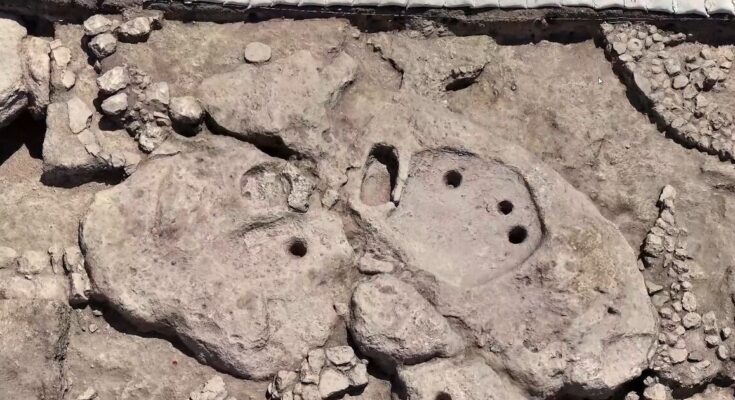At Tel Megiddo, researchers have discovered a 5,000-year-old wine press and ritual objects. These findings provide new insights into early urbanization and Canaanite folk cults.
Archaeologists have discovered one of the country’s oldest winepresses, some 5,000 years old, as well as rare Canaanite cult objects some 3,300 years old near Tel Megiddo in northern Israel. These findings provide new insights into early urbanization and religious practices in the region.
The Israel Antiquities Authority (IAA) conducted excavations as part of the expansion of Highway 66. Researchers discovered a grape press carved into the rock. Amir Golani, one of the excavation leaders, explained: “This wine press is unique and one of the few known from an early period. Until now, we only had indirect evidence that wine was made 5,000 years ago. Now we finally have clear evidence.”
Archaeologists discovered rare ritual vessels from the Bronze Age
In addition to the wine press, archaeologists also discovered ritual objects from the Late Bronze Age, including a zoomorphic ram-shaped vessel that was once used for libations. “The vessels show how liquids such as milk, oil or wine were poured during ceremonies,” the researchers said. A complete set of such vessels is rare, as such objects are usually found only in fragmentary form.
According to the IAA, the findings indicate the existence of a cult practiced outside the city of Megiddo. “This ritual vessel burial site is located directly opposite the large temple area of Tel Megiddo,” the researchers said. They suspect local farmers placed their offerings, such as wine or oil, on open altars without entering the city itself. The finds are on display at the Jay and Jeanie Schottenstein National Campus for Archeology of the Land of Israel in Jerusalem.
Canaan: Historical and Biblical Significance
- In ancient times, the term “Canaan” referred to a region in southwest Syria, which was later expanded to include Palestine.
- The name first appeared in the 13th century BC. BC in Egyptian hieroglyphs on the Merenptah Stele. This term was still used during the reign of Seleucus I before the Romans replaced it with “Syrian”. The true meaning of the name remains unclear; in Egyptian texts it often has a negative connotation.
- In the Bible, Canaan is described as the “Promised Land” promised by God to Abraham and his descendants. This country is described as a land flowing with “milk and honey”.
- The Canaanites are said to be the ancestors of various peoples, such as the Hittites and Amorites.
- According to biblical tradition, the Israelites settled in Canaan after their exodus from Egypt and expelled part of its population.
- The region is also known for its worship of fertility gods such as Ba’al and Asherath, who are often criticized in the Bible.



